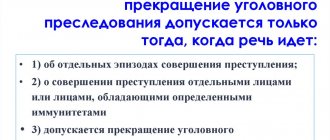According to the Criminal Code of the Russian Federation, exemption from punishment is an opportunity to avoid imposing a sanction at any stage of the investigation of the case. The reasons can be very different: from serious illness to good behavior of the convicted person. Read on to learn more about the legal basis for exemption from serving a prison sentence.
Important! If you are considering your own case related to release from serving a sentence, then you should remember that:
|
Grounds for exemption from criminal punishment
The grounds for exemption from a criminal sanction for a suspect are the absence of reasons for taking him into custody, violations during detention, as well as a situation in which suspicions against a person were not confirmed. If a citizen was detained and could not achieve the application of a preventive measure within 48 hours, he must also be released. In any case, the suspect will be given a certificate stating by whom, when he was detained and for what reason.
For the defendant, the grounds for release are:
- the acquittal;
- guilty verdict without imposing punishment;
- guilty verdict with release from sanction;
- deferment.
Among the grounds for exemption from punishment under the Criminal Code of the Russian Federation, one can also name the imposition of a court fine. This measure allows the court to close the criminal case.
We have looked at the reasons for the suspects and the accused. Let's move on to the conditions for releasing convicted persons from punishment. They can leave prison on parole. Parole is possible if two conditions are met: the person has reformed and also compensated the victim for the harm caused.
When committing a crime of minor or moderate gravity for the first time, a sanction can be avoided if the court establishes that, due to a change in the situation, the attacker or the crime he committed has ceased to be socially dangerous. In addition, prisoners may be released from sanctions in the following cases:
- expiration of the term appointed by the court;
- reversal of the sentence;
- parole;
- replacement with a softer type of sanction;
- pardon or amnesty;
- serious illness or disability.
Release from serving a sentence on parole
Parole is possible no earlier than 6 months after sentencing. The period that must pass depends on the category of the crime:
- more than ⅓ of the term for crimes of minor and medium gravity;
- more than ½ term for serious crimes;
- at least ⅔ of the assigned sanction for especially serious crimes;
- at least ¾ of the term if the violation of the law concerns the sexual integrity of minors;
- ⅘ of the assigned sanction if the child victim of violence was under 14 years of age.
According to the Criminal Code, release from punishment is possible at the request of the convicted person. But a positive decision is not made in every case. The court takes into account the person’s behavior, how he related to his work duties in the correctional institution, the presence of incentives and penalties, the opinion of the prison or colony administration about the advisability of parole.
Note!
Conditional early release from criminal sanctions is also applied to those sentenced to life. To do this you need to spend at least 25 years in prison. Only those prisoners who have not had any malicious violations of order in a correctional institution over the past 3 years will be able to get out on parole.
Released persons are strictly controlled. For committing at least one administrative violation, not to mention a crime, parole is revoked.
Replacement with a more lenient punishment
Another type of exemption from criminal punishment is the replacement of its remaining part with a more lenient measure of responsibility. The rules here are similar to parole, but instead of being released, a person receives a less severe sanction. To count on a replacement, you will have to compensate the harm to the injured party and prove to the court the correction by good behavior.
Part of the sentence can be replaced with a more lenient one after the prisoner has served:
- more than ⅓ of the term (for crimes of minor and medium gravity);
- more than ½ term (for serious crimes);
- at least ⅔ of the assigned sanction (for especially serious crimes);
- not less than ¾ of the term (if a crime was committed against the sexual integrity of a person under 18 years of age), and if the child was under 14 years old - ⅘ of the assigned sanction.
Exemption from punishment due to illness
Resolution No. 54 of the Government of the Russian Federation dated February 6, 2004 is devoted to exemption due to illness from serving a prison sentence or other sanction. It will be possible to avoid sanctions if a person falls ill after he has committed a crime or after a court verdict. If the accused is found to have a mental illness, the sanction is lifted only if, as a result of the illness, the offender does not realize the danger of his actions. Compulsory medical measures are often applied to such persons.
Note!
Upon recovery, the citizen may again be held accountable if the statute of limitations has not expired.
Exemption is possible due to the following diseases:
- tuberculosis;
- various forms of malignant neoplasms;
- diabetes;
- chronic adrenal insufficiency;
- chronic and persistent mental disorder;
- blindness;
- hypertension, arterial hypertension;
- severe congenital or acquired diseases of the musculoskeletal system;
- injuries of the central nervous system with brain damage.
Limitation periods
It will be possible to evade punishment if a lot of time has passed since the crime was committed. The period during which a criminal can be imprisoned is called the statute of limitations. It amounts to:
- 2 years for minor crimes;
- 6 years for moderate severity;
- 10 years for serious crimes;
- 15 years for especially serious cases.
Unconditional release from punishment
We examined the legal grounds for release from serving a sentence. Let's move on to classification. According to the Criminal Code of the Russian Federation, release from punishment can be conditional or unconditional. In the first case, the court releases the person subject to following certain rules, fulfilling specified duties, etc. This type includes parole. The ex-offender must behave well and make restitution to the victim, otherwise he will go back to jail. The conditional type also includes the release of a woman with small children.
The peculiarity of unconditional exemption from criminal sanctions is that no action is required from the citizen. He is released without additional duties. This view is considered final.
There is another classification. According to it, release can be complete or partial. In the first case, the person avoids both the main and additional sanctions. Release while serving the sentence is considered incomplete.
AZ-libr.ru
Article 172. Grounds for release from serving a sentence The grounds for release from serving a sentence are: a) serving the term of the sentence imposed by a court verdict; b) reversal of the court verdict and termination of the case; c) conditional early release from serving a sentence; d) replacement of the unserved part of the punishment with a more lenient type of punishment; e) pardon or amnesty; f) serious illness or disability; g) other grounds provided by law.Comm. Filimonov O.V.
1. Release from punishment means the termination of serving a sentence and the abolition of legal restrictions arising from it. It is carried out in accordance with the norms of criminal and criminal procedural legislation on the grounds and in the manner provided for in Articles 172 and 173 of the Penal Code of the Russian Federation. The most commonly used basis for release from punishment is the completion of the sentence imposed by a court verdict. In this regard, in Article 172 of the Penal Code of the Russian Federation it is placed in first place. The punishment is considered served at the moment of expiration of its term. The responsibility for calculating the term of punishment rests with the body executing one or another type of punishment in relation to a particular convicted person. For example, the calculation of the term of imprisonment is assigned to the special part of the correctional institution in which the convicted person is kept. The beginning of the sentence is calculated on the basis of a court document, and if the person was taken into custody after the sentencing, then on the basis of documents on taking into custody. If such information is absent or contradictory, the body executing the punishment sends a corresponding request to the court. Data on the beginning and end of the sentence are reflected by the executing body in the personal file of the convicted person and accounting documents. 2. Moral and material damage caused to a person who was wrongfully convicted and served part of the sentence imposed can hardly be fully compensated. Nevertheless, the state is doing everything possible to achieve this. In particular, upon release, the person must be explained the Regulations on the procedure for compensation for damage caused to a citizen by illegal actions of the bodies of inquiry, preliminary investigation, prosecutor's office and court, approved by the Decree of the Presidium of the Supreme Soviet of the USSR of May 18, 1981. This legislative act provides for: a) restoration is unreasonable convicted in the previous rights (for example, in the previous position, in a special, military or honorary rank, in class rank, in the rights to lost living space, to the return of state awards); b) material compensation for harm caused by an unjustified conviction (for example, compensation for lost earnings, pensions and benefits, sums of money collected in pursuance of a court verdict, confiscated property). When released from punishment due to the reversal of a sentence in connection with the termination of a criminal case, in order to restore the person’s reputation, not only the basis for his release is indicated in writing, but also an official apology is made on behalf of the state. Release from serving a sentence should be distinguished from release on this rehabilitative basis in cases of review of the case and reduction by a higher court (regional, regional court, supreme court of a republic within the Russian Federation, Supreme Court of the Russian Federation) of the sentence initially determined by the verdict of a lower court. In this case, release is carried out in accordance with the general procedure after the expiration of the sentence established by the court that last made a decision on the case. If the sentence actually served exceeds the sentence imposed after the sentence was changed, the released person has the right to partial compensation for damages. For example, the amount of unjustified deductions from wages while serving correctional labor is returned to him. 3. Conditional early release is one of the fairly frequently used grounds for release from punishment. The decision on parole may be made by the court if the conditions provided for in Article 79 of the Criminal Code of the Russian Federation are met. They are usually divided into material and formal. Material conditions include conviction to such types of punishment as correctional labor, restriction of freedom, restrictions on military service, detention in a disciplinary military unit, imprisonment. Conditional early release from other types of punishment is not provided for by law. Another material condition is the court’s conclusion that the convicted person does not need to serve the entire sentence. The main criterion enabling such a conclusion is the person’s impeccable behavior while serving the sentence. Along with this, other circumstances may be taken into account, such as advanced age, state of health, etc. As formal conditions, the law provides, firstly, for serving certain terms of the above-mentioned punishments. The convicted person must actually serve: a) at least one third of the sentence imposed for a crime of minor or medium gravity; b) at least half of the sentence imposed for a serious crime; c) at least two-thirds of the term of punishment imposed for a particularly serious crime, as well as two-thirds of the term of punishment assigned to a person previously released on parole, if parole was canceled in connection with the commission of a crime or on other grounds provided for by law . Secondly, when sentenced to imprisonment for a certain term, a person in all cases must serve at least six months of the sentence imposed on him, and when sentenced to life imprisonment - at least 25 years. In case of a positive decision on the issue of parole, the court may simultaneously release the person in whole or in part from serving the additional types of punishment assigned to him. The body carrying out early release makes an entry about this in the personal file of the convicted person, his registration documents, as well as documents issued to the person upon release. In case of partial release from additional punishment, its serving continues in the manner prescribed by law until the full expiration of the term. 4. If, when considering the submission, the court refused parole, this does not prevent the administration of the correctional institution from submitting to the court a submission to replace the unserved part of the sentence with a more lenient punishment. The submission must contain data on the behavior of the convicted person, his attitude to study and work while serving his sentence, and the attitude of the convicted person to the committed act. Exemption from punishment due to the replacement of the unserved part of the sentence with a milder type of punishment, according to Article 80 of the Criminal Code of the Russian Federation, can only be applied to persons serving a sentence of imprisonment. Like parole, this institution is applied in the presence of certain material and formal conditions provided for by law. The material conditions for replacing the unserved part of the sentence with a more lenient punishment are: a) the convicted person serving a sentence in the form of imprisonment for a certain period; b) the behavior of the convicted person during the period of serving his sentence, indicating the possibility of achieving the goals of punishment without isolating this person from society in a correctional institution. The formal conditions for such release are: the convicted person has served at least one third of the sentence imposed for committing a crime of minor or moderate gravity; half the sentence - if convicted of a serious crime; at least two-thirds of the sentence imposed for committing a particularly serious crime. 5. Release from punishment may be carried out on the basis of pardon or amnesty. According to Article 176 of the Penal Code of the Russian Federation, a convicted person has the right to appeal to the President of the Russian Federation with a petition for pardon. The convicted person submits the petition through the administration of the institution or body executing the sentence. According to clause “e” of Article 103 of the Constitution of the Russian Federation, the announcement of an amnesty falls under the jurisdiction of the State Duma of the Federal Assembly of the Russian Federation. By the amnesty act, convicts can
be released from punishment or the punishment assigned to them may be reduced or replaced with a more lenient punishment. Such persons may also be released from additional punishment. Those who have served their sentence may have their criminal record expunged. The legal form of declaring an amnesty is a resolution of the State Duma, which indicates which categories of convicts it applies to and to what extent. The categories of convicts to whom the amnesty does not apply are determined. Usually, a separate resolution is also adopted on the procedure for applying the amnesty, indicating the bodies that should implement it. To resolve the issue of the possibility of applying an amnesty to specific convicts, commissions are created with the participation of employees of the prosecutor's office, institutions and bodies executing punishments, deputies and other representatives of the public. They study the personal file of the convicted person,, if necessary, hear from him, and then make a decision. The commission's written decision serves as the immediate basis for releasing a person from further serving his sentence. 6. In some cases, it may become impossible for a convicted person to continue serving his sentence due to a significant deterioration in his health. Taking into account this circumstance, Part 2 of Article 81 of the Criminal Code of the Russian Federation allows for the possibility of exemption from serving a sentence for a person who, after committing a crime, has fallen ill with a serious illness that prevents the execution of the imposed sentence. Therefore, Article 172 of the Penal Code of the Russian Federation provides for serious illness or disability of the convicted person as one of the grounds for exemption from punishment. The list of diseases that are grounds for consideration for early release is approved by the Government of the Russian Federation. Usually, in addition to mental disorders, this list includes acute forms of tuberculosis, malignant tumors, diseases of the endocrine system, sensory organs, blood circulation, digestion, kidney disease, musculoskeletal system, anatomical defects formed as a result of illness or injury during the last sentence (high amputations limbs). In the event of such a disease or disability of the convicted person, the head of the institution or body executing the sentence submits to the court a proposal to release the person from serving the sentence. A medical report and the personal file of the convicted person are attached to the submission. If the illness is not of the nature of a mental disorder, then the submission must contain data characterizing the personality and behavior of the convicted person during the period of serving his sentence. When a convicted person’s illness occurs as a result of his intentional actions (self-mutilation), he is not eligible for release, except in cases where the person caused harm to himself in a state of mental disorder. In accordance with the norms of criminal procedural legislation, in the case of mental illness, the judge, on the recommendation of the institution or body executing the sentence, based on the conclusion of the medical commission, makes a decision to release the convicted person from further serving the sentence. The court may impose compulsory medical measures on such a person or transfer him to the care of health authorities. If the convicted person falls ill with another serious illness, the judge decides on his release from serving his sentence, taking into account the severity of the crime committed, personality characteristics and other circumstances. For convicts for whom release due to illness is denied, if the course of the illness worsens, the materials are re-sent to the court, regardless of the time of refusal. 7. Article 172 of the Penal Code of the Russian Federation allows for the possibility of release from serving a sentence on other grounds provided by law. Such grounds include, first of all, changes in the criminal law. According to Article 54 of the Constitution of the Russian Federation, “a law establishing or aggravating liability does not have retroactive force.” At the same time, Article 10 of the Criminal Code of the Russian Federation states: “A criminal law that eliminates the criminality of an act, mitigates punishment or otherwise improves the position of the person who committed the crime, has retroactive effect, i.e., applies to persons serving a sentence. If a new criminal law mitigates the punishment for an act that is being served by a person, then this punishment is subject to reduction within the limits provided for by the new criminal law.” Exemption from serving a sentence due to the publication of a criminal law with retroactive effect, in accordance with the norms of criminal procedural legislation, is carried out by the judge at the place of execution of the sentence, at the request of the convicted person or at the request of the prosecutor or the body in charge of executing the sentence. In accordance with Part 3 of Article 82 of the Criminal Code of the Russian Federation, women who were previously subject to a deferment of serving their sentence may be released from serving the remaining unserved part of their sentence. In accordance with Article 29 of the Federal Law “On the Prosecutor's Office of the Russian Federation,” the basis for release may be a decision of the prosecutor to release from places of imprisonment a person held there without legal grounds.
Exemption from punishment of minors
The measure of responsibility under the Criminal Code of the Russian Federation is generally imposed from the age of 16, in especially serious cases - from the age of 14. However, being a minor is a mitigating factor in itself, so courts tend to choose less severe types of sanctions. The court may release a minor defendant from punishment with the use of educational measures. These include:
- warning;
- transfer under supervision;
- demand to make amends;
- restriction of leisure.
The peculiarity of the release from punishment of minors is that a teenager who has committed a serious violation for the first time may not be punished with imprisonment, but placed in a special closed educational institution. This is possible for a maximum of 3 years.
Note!
A teenager will not be able to avoid sanctions if he commits a particularly serious crime.
Conditional early release from criminal punishment for minors also has its own nuances. The time limits are different from those for adult offenders. A person under 18 years of age can be released on parole if a third of the term has passed (for minor, moderate and serious crimes) or ⅔ of the established period (if a particularly serious crime has been committed).
We must not forget about the expiration of the statute of limitations. For teenagers, the period is half as long:
- 1 year for mild severity;
- 3 years - for acts of moderate gravity;
- 5 years - for serious crimes;
- 7.5 years - for especially serious acts.
Features of exemption from additional punishments
It should be remembered that exemption from additional punishment in the form of deprivation of a special rank, military rank, honorary title, class rank, state award is possible only through filing an appropriate complaint. Moreover, if the additional punishment was partially executed: for example, the fine was not collected in full, and the period of prohibition from holding certain positions or engaging in certain activities has already begun to run, the court may exempt from this type of punishment on a cassation appeal or on a petition for probation. - early release of a convicted person.
You can be released from the restriction of freedom for the remaining period either by cassation appeal or by the presentation of the penal inspection; for this, the convicted person must contact the head of the relevant penitentiary institution.
If the additional punishment was not carried out at all - the period of restriction of freedom, the ban on holding certain positions or the period of engaging in certain activities has not begun to run, the fine has not been paid, and the deprivation of a special rank, military rank, honorary title, class rank, state award has not yet been carried out – then, upon the complaint of the person brought to criminal liability, the court may release this person from such punishment in full.
From the above, we can conclude that full or partial release from additional punishment is possible only in four cases: an appeal or cassation complaint by a person or his defense attorney against a court verdict, on a petition for conditional early release from an additional punishment, or on the presentation of a criminal justice. executive inspection. In such situations, most people do not know what to do or who to turn to for help. Remember that even if several types of punishments have been imposed on a person, they can be challenged or canceled ahead of schedule. Come and we will figure out what to do in your situation: individually, professionally and on favorable payment terms.
Termination of serving a sentence and the procedure for releasing convicts
The procedure for releasing convicts from serving their sentences is contained in the Penal Code of the Russian Federation. In the first stage, the prisoner is notified that he can be released. The period depends on the circumstances. If the sentence is about to end, 30 days' notice is given, if the prisoner is due to be released on parole, on the same day the person leaves prison.
Note!
The former prisoner is given things, valuables and money that were kept in his account. He is also given a passport, papers on release from sanctions and documents on work activity in prison.
A prisoner can be released on parole on the same day when the court decision or ruling comes into force. The same applies to early release with pardon and amnesty.
In some cases, persons released are subject to supervision. Especially if the citizen served a sentence for a dangerous or especially dangerous recidivism, crimes against the sexual integrity of a minor, as well as for committing a serious or especially serious crime. They can also control their further residence in cases where the prisoner has repeatedly been caught violating the order in a correctional institution. Supervision is carried out by district commissioners.







